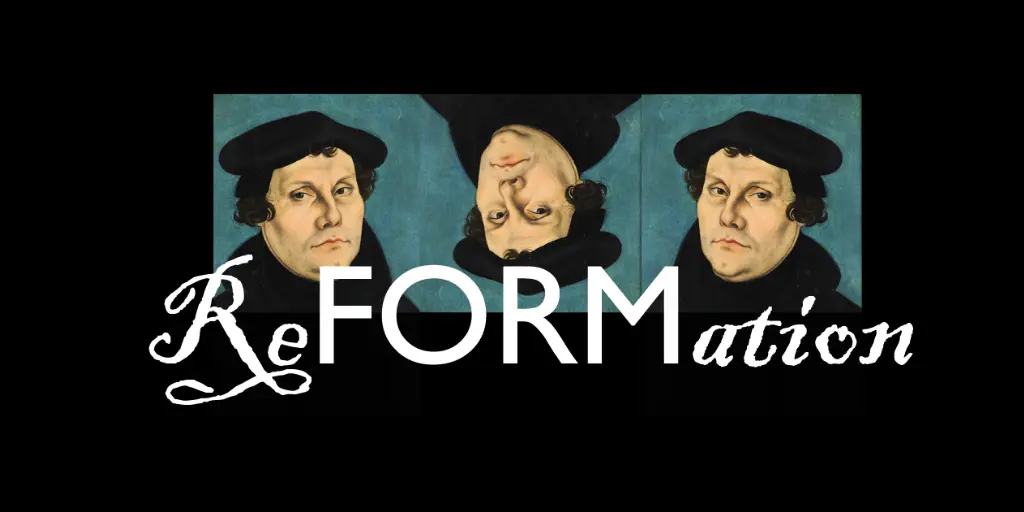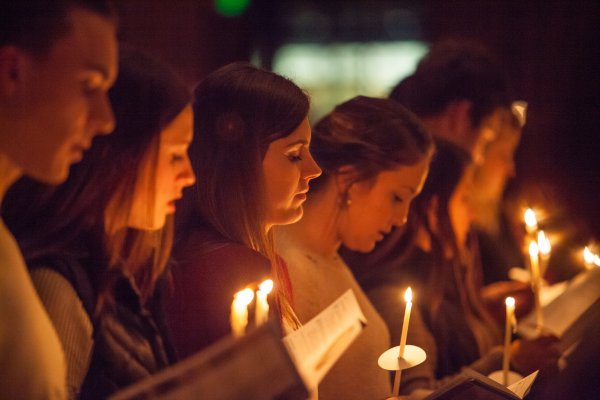You might be a Lutheran if…

“And the Word became flesh and dwelt among us, and we have seen his glory, the glory as of a father’s only son, full of grace and truth…From his fullness we have all received, grace upon grace. The law indeed was given through Moses; grace and truth came through Jesus Christ. No one has ever seen God. It is the only Son, who is close to the Father’s heart, who has made him known.” -John 1:14, 16-18
“You might be a Lutheran if your five-year-old recites the Old Testament books as: ‘Genesis, Exodus, Lutefisk…’”
(With apologies to non-Lutheran readers. I’m starting off deep in Lutheran World this week…but stick with me, we’ll get more universal.)
As we’re approaching Reformation Day (the anniversary of Martin Luther nailing the 95 Theses to a church door and sparking the Reformation), I’ve been thinking back to something a (non-Lutheran) professor once said to me: “Lutheranism is one of the few denominations that is still pretty much ethnically-based.”
What he meant was: we don’t — and probably can’t — assume anything about the heritage of a person just by knowing that they are Baptist or Methodist or Catholic. But if you meet a Lutheran, you can guess that they have a German or Scandinavian background (doncha know?).
But here’s the thing: from a global perspective, that is not true anymore! According to 2019 data from the Lutheran World Federation, there are currently many, many more Lutherans in Africa (28 million) than in the Nordic countries (18 million, the next-highest number). Germany is the country with the most Lutherans (10.8 million), but Ethiopia is not far behind (10.4 million), and third place goes to Tanzania (7.9 million).
This data matches the trend in Christianity overall. In 2020, two-thirds of Christians lived in the “Global South” (Africa, Asia, Latin America, Oceania). In North America and Europe we fret over declines in church membership, but the “decline of Christianity in the Global North is now being outpaced by the rise of Christianity in the Global South” according to the International Bulletin of Mission Research.
I know, I know. “Thanks for the random info, Pastor — but I’m here for devotional time!”
One of the great mysteries — and amazing graces! — of the Christian faith is the Incarnation. “The Word became flesh” in Jesus of Nazareth: a particular person from a particular place in a particular time who lived within a particular culture. God’s universal presence and truth became very, very specific.
Then our specific savior gave us the commission: “Go and make disciples of all nations” (Matt. 28:19). The Church decided pretty quickly that converts of “all nations” would not have to give up their own culture and take on everything about Jesus’s Jewish culture in order to become part of God’s family. This is what we see Paul working through over and over in his New Testament letters (see Galatians 6:11-16, for instance).
This is amazing. It points us toward faith that the universal truth of the Gospel becomes specific for each of us. God speaks to us right where we are: in our own cultures, our own identities, our own questions and longings. Like Paul preaching to the Athenian philosophers from their own philosophy (Acts 17). Like Jesus sharing the gospel with the hungry through food. Like the way some Lutherans seem to connect with God best through the music of Bach. Like how Tanzanian Christians praise God with ululation. God connects to us in ways we understand with the messages we need to hear.
This diversity is also a great gift to the Body of Christ. When another person explores their faith with traditions, questions, and experiences that are different from mine, that means they may be learning things about God that I wouldn’t even think about. That’s why I love reading Bible commentaries from around the world, or even from U.S. traditions that are different from my own. These siblings in Christ help me see things in new ways. Russian Christians taught me to focus in on the famine that shows up in the Prodigal Son. Scholars from the Black Church taught me to connect Jesus’ crucifixion to unjust deaths in our own time.
God has given us each other. God has given us diversity. And these are wondrous gifts.
Prayer:
God of all nations, you send your Spirit to speak to us in our native tongue, through the stories and symbols of our families. You also send us each other to share new insights, to explore new questions, and to help one another know you. Open our minds to hear what you are teaching others. Give us the words to share what you are doing in our lives. In Jesus name, Amen.
Pr. Kate
Oct. 27, 2021
Pastor Jim and Pastor Kate take turns writing weekly devotions for the Chapel of the Resurrection. Contact them here:
- Archives of Devotional Writings from our Pastoral Staff
- “HELP!”
- “Some Lent!”
- (Your vocation here) of people
- A call to courage for 2021
- A charming tale for over-achievers
- A Lesson On Beans … and Being
- A New Place
- A Point of Privilege
- A season of anticipation
- A Time of Dust
- Acquiring a peaceful spirit
- Advent = Hope
- All will be well
- Anastasis: the Greatest Story of God’s Saving Power
- Another kind of darkness
- Are we willing to cross the road for one another?
- As if we needed a reminder
- Beacons of hope
- Better Together
- Blessings As You Go
- Borderlands
- Can we learn to be happy?
- Carrying the COVID Cross
- Come and See
- Did Jesus really suffer?
- Doing without in a life of plenty
- Don’t miss this moment
- Exiles with Vision
- Fear not!
- Fear of the Lord
- Feeling at Home
- Finding Purpose in the Journey
- Finding Words for Times Like These
- Forgiving others – and ourselves
- Getting ahead with Jesus
- Getting down on Jesus’ level
- Getting through this together
- God is not overwhelmed
- Good Friday
- Grief & Graduation
- Have yourself a merry little Christmas — somehow
- Holy Week and Taking Out the Trash
- Holy Week: The aid station late in the semester
- Hopes & Dreams vs Life in the Wilderness
- How do you keep from giving up hope?
- How glad we’ll be if it’s so
- I almost slipped
- Imagining Eternity
- In a time of uncertainty, these things are certain
- In everything, grateful
- In praise of plans B … C … D …
- In the midst of grief, God will bring life
- Is there such a thing as being too forgiving?
- It’s a Three Day Weekend!
- It’s In the Bag
- It’s What’s Happening
- Jesus among us
- Killing off our future selves
- Knowing a Good Thing When We See It
- Lessons in fire building
- Let there be light!
- Let us work for real wellness in our communities
- Life Is a Highway
- Lilies and leaves and whatever else is beautiful
- Living in the Present
- Naming our demons
- O Lord, you know I hate buttermilk
- Of Fear and Failure
- On Christian Unity: When we’re not one big happy church
- On the Bucket List
- On the day after the night before
- Overwhelmed
- Persistent and Extravagant
- Pray and Let God Worry
- Praying for Reconciliation
- Preparing for the world to be turned rightside up
- Recovering from an Epic Fail
- Reformation calls for examination
- Remembering among the forgetful
- Rest
- Rest is Holy
- Right where we are
- Seeing beauty in brokenness
- Signs of Love
- Starting Small
- Still in the storm
- Surprisingly Simple: Breathe!
- Taking a Break from the Relentless
- Talking ourselves into it
- Thankfulness leads to joyfulness
- The Art of Holy Week
- The Funny Business of Forgiveness
- The Greatest of These is Love
- The Magi: Exemplars of Faith and Learning
- The Power of Small Conversations
- The Trouble with Mammon
- The Power of Taking a Sabbath
- The Spiritual Gift of Hindsight
- This can’t be done alone
- To be known
- Too.Much.
- You might be a Lutheran if…
- You will be in our prayers this summer of 2020
- Ventures of which we cannot see the ending
- WWJD? We already know
- Walking in the Light of Jesus’ Resurrection
- We had hoped
- We’re on a mission from God
- What do you do with your anger?
- What good is a shepherd?
- What is your base reality?
- What to do after you find your voice
- What to do on the day after
- What we know and what we don’t know
- When bad things happen
- When God uses something terrible for good
- When heaven & earth click
- When joy and sadness live together
- When stress overwhelms
- When the promise of resurrection is hard to believe
- When you offer up your broken cup
- When we are moved
- Where God will be found
- Where is the good shepherd carrying you?
- Wilderness Journeys
- Won’t you be my neighbor?
- Year-end time management: Keeping the main thing the main thing
- Your Valpo roots will help you grow into your future
